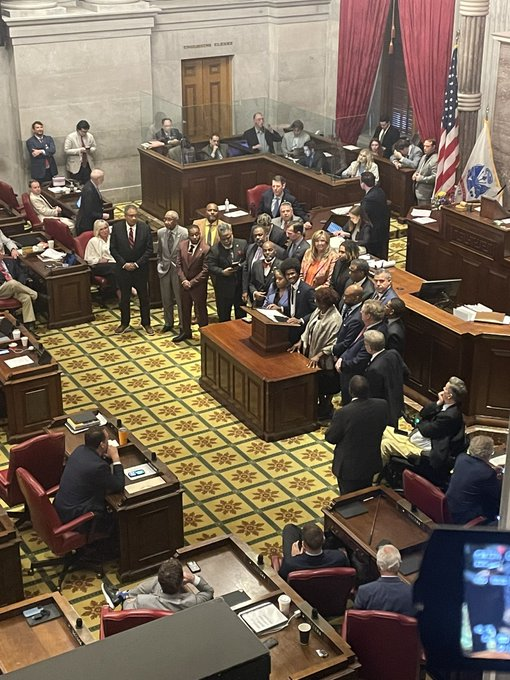
Tennessee state representatives Tennessee State Representatives Justin Pearson, Justin Jones, and Gloria Johnson (l-r above) broke the rules. In the wake of the most a recent mass shooting at a Christian school in Nashville, protesters filled the chamber’s galleries and surrounded the state capitol. Unarmed and nonviolent, they were nonetheless vigorous, demanding legislative action on gun safety, and yelling at the legislators who were determined not to give them what they wanted. The Tennessee 3 amplified the protesters, moving to the well of the chamber and chanting through a megaphone. They didn’t wait to be recognized.
The protesters outdoors included many young people, students from local high schools and universities, and they were well aware that a large majority of the House was far more likely to make it easier for Tennesseans to get guns rather than impose any restrictions. Just two years ago, Tennessee passed a law allowing anyone over 21 to carry a handgun (openly or concealed) without a license; the legislators are due to consider a reform that would lower the age of permitless carry to 18, and include more weapons.
The protesters said they were scared, but they looked angry.
The Tennessee 3 weren’t in the well for very long before the House leadership gaveled in a recess, ending the session. The Republican Speaker of the state house first blamed the protesters, comparing them to the January 6 insurgents at the US Capitol. Some of the Republicans said they were scared–but they looked angry.
They were particularly angry at their three Democratic colleagues who, absolutely, violated rules of procedure and decorum. Members of the Republican majority were determined to respond to protect their vision of the legislature. It’s important to remember that the Republicans enjoy a huge advantage in the House, with 75 Republicans and 23 Democrats. The majority in any legislative body has many options for punishing members who offend:
Individuals can talk with their colleagues privately, and express their opinions.
A majority can pass a resolution of disapproval or censure and formally rebuke a member.
The House leadership can strip a member of committee membership, staff, or office space.
Or the majority can kick a member out, although it’s difficult. It takes a 2/3 majority to expel a member, and it doesn’t happen much. The New York Times reports:
“Six lawmakers were expelled from the Tennessee House in 1866, immediately after the Civil War, for seeking to prevent the ratification of the Fourteenth Amendment, which granted citizenship to formerly enslaved people. Since then, the House of Representatives in Tennessee has voted only twice to oust a lawmaker. Both votes were bipartisan: in 1980, after a sitting lawmaker was convicted of soliciting a bribe, and in 2016, after the House majority whip faced allegations of sexual misconduct while in office.”
On April 6, after a long and contentious debate, the majority voted to expel Reps. Pearson and Jones, but came one vote short of kicking Rep. Johnson out. It is lost on absolutely no one that, unlike Johnson, Pearson and Jones are young Black men.
I don’t know if the Republican majority meant to send a message, but they surely did. If they didn’t realize it at the time, they will certainly be schooled and reminded–again and again.
All of this matters, not just for school safety or gun regulation or racial politics in America. Democracy depends upon the losers continuing to participate in the system, albeit not necessarily happily or with optimism, and certainly not politely. But they must stay engaged. The system depends upon minorities keeping faith that they might someday win.
Reps. Pearson and Jones may well be back in the legislature soon, appointed by county committees or reelected by constituents who value the passion and commitment they displayed.
Or they, or some of their supporters, may decide that the institutions of their state government are so inaccessible and unresponsive that stronger measures must be taken.
That’s what the January 6 insurgents thought.




Pingback: Pushing protest outdoors in Tennessee - thedailyredstate